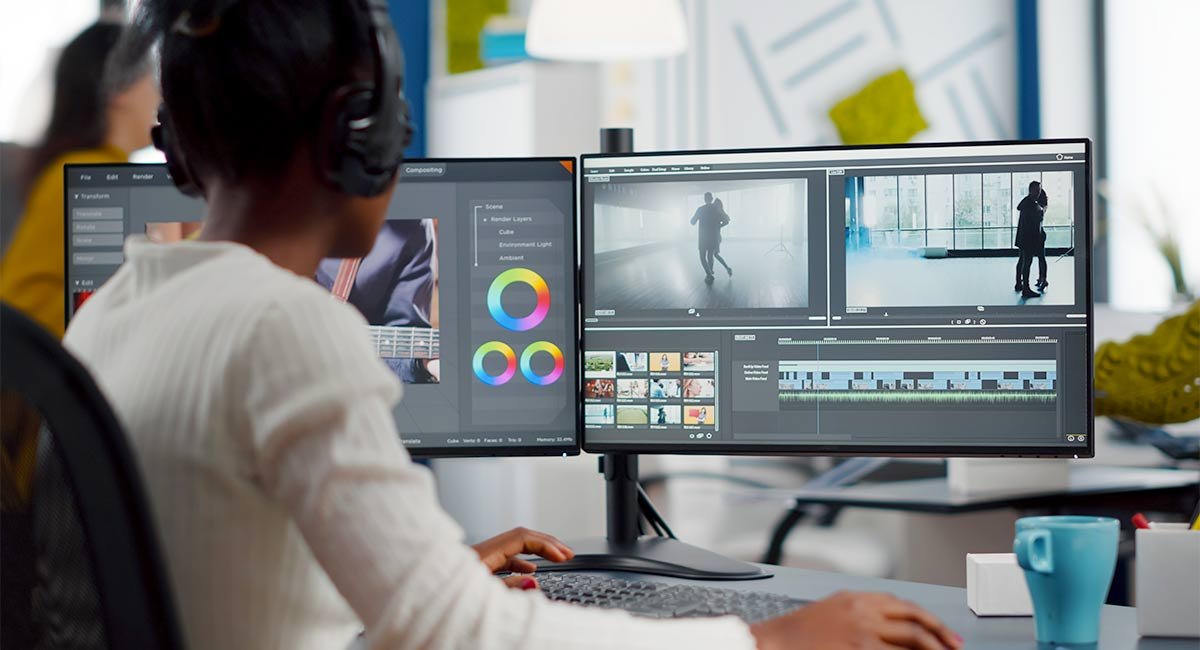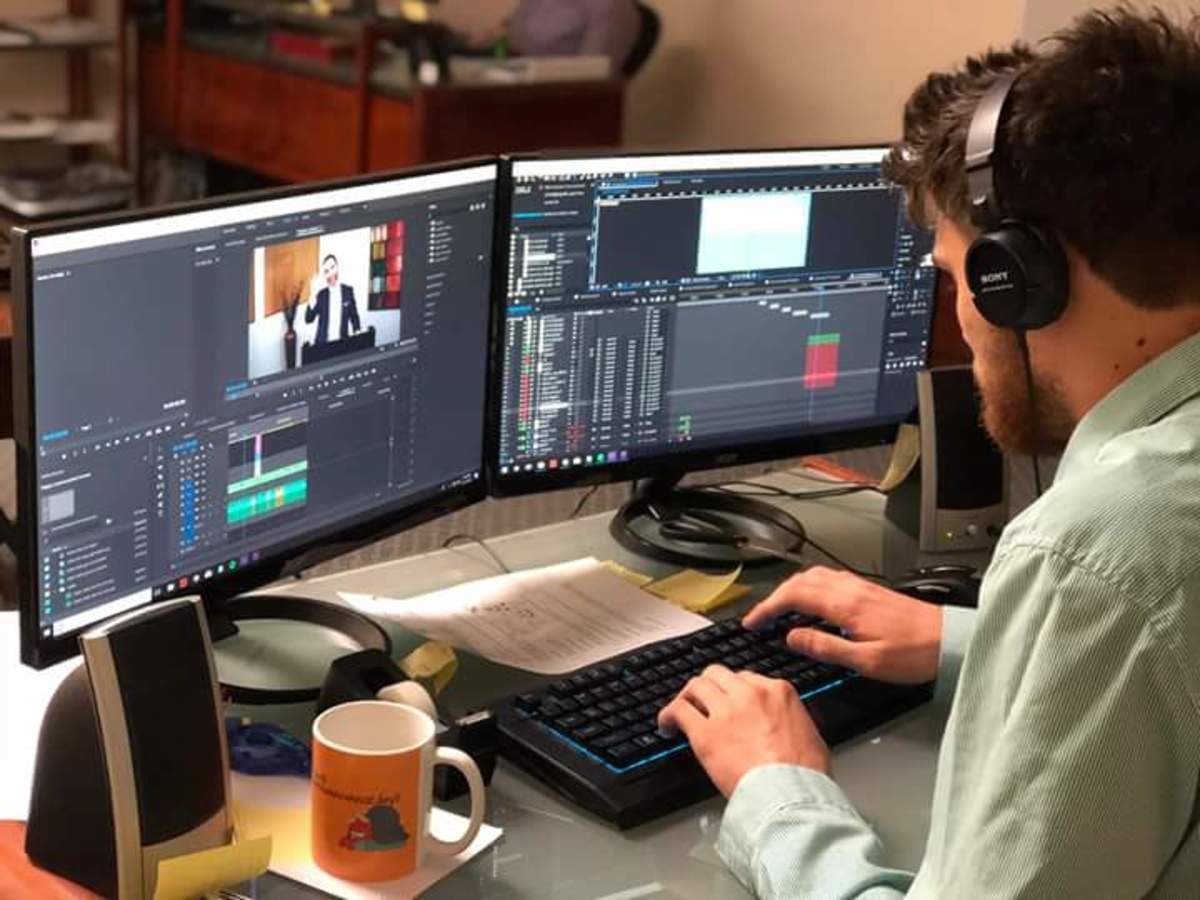Remote video editing jobs offer professionals the flexibility to work from home while showcasing their creativity and technical skills. In today’s digital age, the demand for high-quality video content is ever-growing across various industries, including entertainment, marketing, education, and more. As a result, companies and individuals seek talented video editors who can transform raw footage into polished, engaging videos.
The beauty of Remote Video Editing Jobs lies in their accessibility. Whether you’re a seasoned editor with years of experience or a newcomer eager to dive into the world of video editing, remote opportunities provide a platform to showcase your talents without geographical limitations. With the right equipment and software, you can collaborate with clients and teams from around the globe, turning visions into reality from the comfort of your own workspace.
Skills Required for Remote Video Editing Jobs

- Technical Proficiency: Remote video editors must be proficient in using video editing software such as Adobe Premiere Pro, Final Cut Pro, or DaVinci Resolve. They should have a deep understanding of editing techniques, transitions, effects, and audio manipulation.
- Understanding of Video Formats: Knowledge of various video formats, codecs, and resolutions is crucial for ensuring compatibility and maintaining high-quality output across different platforms and devices.
- Creative Storytelling: Remote video editors need strong storytelling skills to effectively convey the intended message or narrative through visual content. They should be able to craft compelling stories, select appropriate footage, and sequence scenes in a way that engages the audience.
- Visual Communication Skills: The ability to communicate visually through editing is essential. This includes understanding principles of composition, color theory, and visual hierarchy to create visually appealing and impactful videos.
- Remote Collaboration: As remote workers, video editors must excel in remote collaboration tools and communication platforms. They should be adept at conveying ideas, giving feedback, and collaborating with clients and team members effectively over email, video calls, or project management tools.
- Time Management: Meeting project deadlines is critical in remote video editing jobs. Editors should possess strong time management and organizational skills to prioritize tasks, allocate sufficient time for editing, and deliver projects on schedule.
- Problem-Solving: Video editing often involves troubleshooting technical issues and finding creative solutions to challenges that arise during the editing process. Remote editors should be resourceful and adept at problem-solving to overcome obstacles efficiently.
- Attention to Detail: Remote video editors must have a keen eye for detail to ensure the final product meets quality standards. This includes checking for continuity errors, audio discrepancies, and visual imperfections that may detract from the overall viewer experience.
- Client Management: Building and maintaining positive relationships with clients is essential for repeat business and referrals. Remote editors should possess excellent client management skills, including active listening, empathy, and the ability to address client feedback and revisions promptly.
- Adaptability and Continuous Learning: The field of video editing is constantly evolving with new technologies and trends. Remote editors should be adaptable and willing to learn new techniques, software updates, and industry best practices to stay relevant and competitive in the field.
Work From Home: Graphic Design Jobs
Tools of the Trade for Remote Video Editing Jobs

- Computer: A powerful computer with sufficient processing power, RAM, and storage is essential for smooth video editing workflows. Whether it’s a desktop or a laptop, the computer should meet the technical requirements of the chosen Remote Video Editing Jobs software.
- Monitor: High-resolution monitors with accurate color reproduction are crucial for visual editing tasks. A dual-monitor setup can enhance productivity by providing more screen real estate for arranging timelines, previewing footage, and managing project assets.
- Video Editing Software: Industry-standard video editing software such as Adobe Premiere Pro, Final Cut Pro, or DaVinci Resolve is necessary for editing, compositing, and refining video footage. These software packages offer a wide range of tools for editing, color grading, audio mixing, and visual effects.
- Collaboration Tools: Remote video editors rely on collaboration tools to communicate with clients and team members, share project files, and receive feedback. Platforms like Frame.io, Wipster, or Vimeo Review provide features for real-time commenting, version control, and seamless collaboration on video projects.
- Cloud Storage: Cloud storage services such as Google Drive, Dropbox, or OneDrive are indispensable for securely storing and sharing large video files and project assets. Cloud storage facilitates remote access to files from anywhere with an internet connection, enabling seamless collaboration and backup of project files.
- Communication Software: Video conferencing tools like Zoom, Microsoft Teams, or Slack enable remote video editors to communicate with clients, colleagues, and collaborators in real-time. These platforms facilitate virtual meetings, screen sharing, and instant messaging for efficient collaboration and project management.
- Graphics Tablets (Optional): Graphics tablets such as Wacom Intuos or Huion tablets are useful for precise control when performing tasks like drawing masks, creating animations, or retouching images in video editing software. While not essential, graphics tablets can enhance the editing workflow for certain tasks.
- Color Calibration Tools (Optional): Color calibration tools like X-Rite i1Display Pro or Datacolor SpyderX ensure accurate color representation on monitors, critical for professional video editing and color grading. Calibrating monitors regularly helps maintain color consistency across different devices and viewing environments.
- Video Effects Plugins (Optional): Additional video effects plugins and presets can expand the creative possibilities in video editing software. Plugins like Red Giant’s Magic Bullet Suite or Boris FX Continuum offer advanced visual effects, color grading tools, and motion graphics templates for enhancing video projects.
- Backup Solutions: Reliable backup solutions such as external hard drives, NAS (Network-Attached Storage), or cloud backup services are essential for protecting valuable project files against data loss. Regular backups ensure that editing work is safeguarded and can be recovered in case of hardware failure or accidental deletion.
Accounting Work From Home: Remote Earning Guide
Finding Remote Video Editing Jobs Opportunities

- Online Freelance Platforms: Explore popular freelance platforms such as Upwork, Freelancer, and Fiverr, where clients post Remote Video Editing Jobs projects. Create a compelling profile highlighting your skills, experience, and portfolio to attract potential clients. Regularly browse job listings and submit proposals tailored to the specific requirements of each project.
- Remote Job Boards: Check remote job boards dedicated to listing remote work opportunities across various industries. Websites like Remote.co, We Work Remotely, and Remote OK often feature remote video editing jobs from companies worldwide. Set up job alerts to receive notifications for relevant openings matching your skills and preferences.
- Networking: Leverage your professional network to uncover Remote Video Editing Jobs opportunities. Connect with fellow video editors, filmmakers, and industry professionals on social media platforms like LinkedIn, Twitter, and industry-specific forums. Engage in discussions, share your work, and express your interest in remote editing projects to expand your network and discover potential job leads.
- Industry-Specific Websites: Explore websites and online communities dedicated to the film, television, advertising, and digital media industries. Websites like ProductionHUB, Stage 32, and Mandy frequently list remote video editing gigs, freelance projects, and job opportunities in the entertainment sector. Join relevant groups and forums to stay informed about industry news and job postings.
- Company Websites: Visit the career pages of companies, media agencies, production studios, and content creation firms that offer remote work options. Many organizations now offer remote positions for video editors to work on projects remotely. Regularly check their job listings or reach out directly to inquire about remote editing opportunities.
- Freelance Marketplaces: Explore specialized freelance marketplaces focused on creative professionals, such as Creative Circle, ArtStation, or ProductionBeast. These platforms often feature remote video editing jobs, motion graphics projects, and freelance opportunities in the media and entertainment industry. Create a profile showcasing your expertise and portfolio to attract potential clients.
- Creative Communities: Join online communities and forums specifically tailored to Remote Video Editing Jobs, such as Reddit’s r/VideoEditing or forums like Creative COW. These communities often have dedicated job boards or threads where members share remote editing job opportunities, freelance gigs, and collaboration projects. Actively participate in discussions, share your insights, and network with fellow editors to discover job leads.
- Cold Pitching: Take a proactive approach by reaching out to potential clients or companies directly with personalized pitches showcasing your skills and expertise in remote video editing. Research companies or content creators producing video content relevant to your niche and send tailored proposals or introductory emails outlining how you can contribute to their projects remotely.
- Portfolio and Website: Maintain an updated portfolio showcasing your best work, editing style, and versatility as a remote video editor. Create a professional website or online portfolio where potential clients can view your reel, sample projects, and client testimonials. Optimize your portfolio for search engines to increase visibility and attract inbound inquiries from clients seeking remote editing services.
- Referrals and Recommendations: Leverage word-of-mouth referrals and recommendations from satisfied clients, colleagues, or industry contacts to uncover remote video editing job opportunities. Encourage clients to recommend your services to their network or provide testimonials that can be showcased on your website or portfolio. Building a strong reputation for delivering high-quality work and exceptional customer service can lead to repeat business and referrals in the remote editing industry.
Software Testing Jobs: Work From Home
Tips for Success in Remote Video Editing Jobs

- Effective Communication: Maintain clear and open communication channels with clients, team members, and collaborators throughout the project. Use email, video calls, or project management tools to stay in touch, provide updates, and address any concerns or questions promptly.
- Set Clear Expectations: Establish clear expectations regarding project timelines, deliverables, revisions, and communication protocols upfront. Ensure that both you and the client are aligned on project scope, deadlines, and goals to avoid misunderstandings or scope creep later on.
- Create a Productive Workspace: Set up a dedicated workspace at home conducive to focus and productivity. Minimize distractions, organize your tools and files efficiently, and create a comfortable environment that inspires creativity and concentration.
- Adhere to Deadlines: Honor project deadlines and deliverables by managing your time effectively and prioritizing tasks accordingly. Break down larger projects into smaller, manageable tasks with deadlines to track progress and ensure timely completion.
- Continuously Improve Skills: Stay updated with the latest trends, techniques, and software updates in the field of Remote Video Editing Jobs. Invest time in learning new editing techniques, experimenting with different styles, and honing your craft to enhance your skills and stay competitive in the industry.
- Embrace Feedback: Welcome constructive feedback from clients and collaborators as an opportunity for growth and improvement. Actively listen to feedback, incorporate suggestions where appropriate, and strive to exceed expectations with each project iteration.
- Be Flexible and Adaptive: Adapt to changes in project requirements, client preferences, or unexpected challenges that may arise during the editing process. Remain flexible and agile in your approach, seeking creative solutions to overcome obstacles and deliver high-quality results.
- Maintain Professionalism: Uphold professionalism in all interactions with clients, colleagues, and collaborators. Be responsive, courteous, and respectful in your communication, and strive to build trust and credibility through your reliability and professionalism.
- Backup and Secure Data: Regularly backup your project files and assets to prevent data loss in case of technical issues or hardware failure. Utilize cloud storage solutions or external hard drives to securely store and protect your work files.
- Seek Balance and Self-Care: Prioritize your physical and mental well-being by maintaining a healthy work-life balance. Take regular breaks, engage in physical activity, and practice self-care habits to prevent burnout and sustain long-term productivity and creativity in your Remote Video Editing Jobs career.
Conclusion
In conclusion, Remote Video Editing Jobs offer a world of opportunities for creative professionals seeking flexibility, autonomy, and diverse project experiences. As the demand for high-quality video content continues to rise across industries, remote editors play a pivotal role in bringing visions to life from anywhere in the world.
By harnessing their technical skills, creativity, and communication abilities, Remote Video Editing Jobs can thrive in a dynamic and ever-evolving industry landscape. From collaborating with clients and team members remotely to honing their craft through continuous learning and improvement, success in remote video editing jobs requires adaptability, professionalism, and a passion for storytelling.
Other Questions
- What skills are required for Remote Video Editing Jobs?
Technical proficiency with editing software, creative storytelling, remote collaboration skills, time management, and attention to detail.
- Where can you find Remote Video Editing Jobs opportunities?
Online freelance platforms, remote job boards, networking, company websites, creative communities, and through referrals.
- Where can you find Remote Video Editing Jobs opportunities?
Online freelance platforms, remote job boards, networking, company websites, creative communities, and through referrals.




